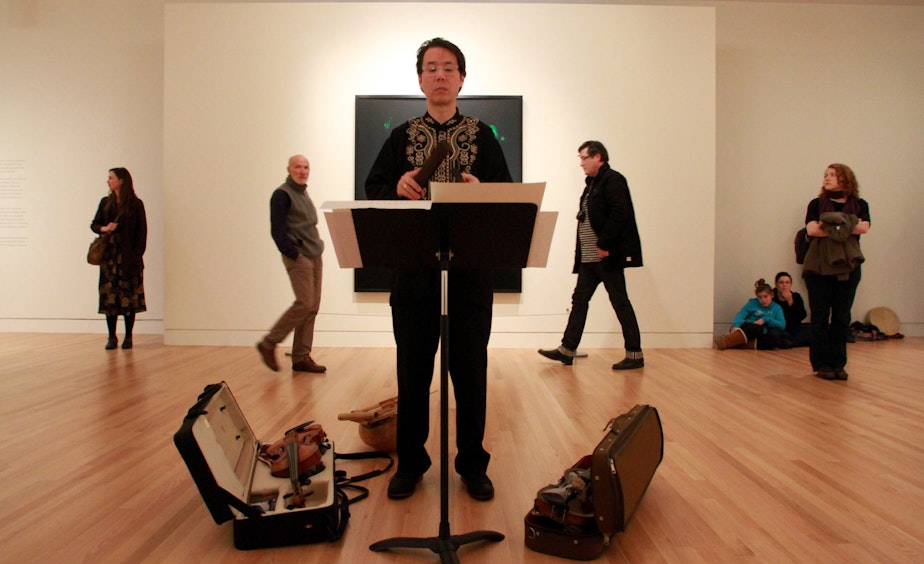Seattle Composer Eyvind Kang Inspires Local Musicians

Eyvind Kang is a violist, composer and improviser who lives in Seattle. You might not have heard of him before, but he’s played with the pop stars Beck and Laurie Anderson and with big names in jazz and new music like Bill Frisell and John Zorn. All these artists are drawn to Eyvind because of his playing, his musical imagination and his unpredictability.
A conversation with Eyvind Kang always veers off in unexpected directions. If you ask about his early musical experiences you won’t hear about a favorite childhood record or the first time he played the violin. He’ll tell you what the instruments looked like — how the objects themselves drew him in.
"I clearly remember the first time I saw a double bass as a kid it was just amazing to me," recalls Kang. "And then the brass instruments, how they glow. And something like a drums set seems to gleam under lights.”
Recently Kang became enthralled by the sounds of birds he heard on the Puget Sound shoreline.
“It’s really insane if you sit and listen to them closely with your eyes closed, the dimensionality of the movement, plus the tempo — that is an amazing sound,” says Kang.
Sponsored
Kang takes the experience of hearing birds flying around and makes music out of it. Kang recently conducted a piece at Seattle’s Frye Art Museum that featured some of the city’s leading improvisers and new music performers. They moved in and out of different galleries, exploring ideas of movement, space and dimension in music.
Kang likes the challenge of capturing difficult musical concepts on paper. He points to some musical notation he’s created. The pages are filled with numbers and fractions. This doesn’t look like music. It looks like something out of a math textbook.
“The first figure here is 35 over 66, so you do something 35 times at 66 [beats per minute]," explains Kang. "And then when you get done with that, you go 34 over 92, 3 over 50, and you just read it all the way down.”
Kang invents complex notations like this so he can get as close as he can to the sounds produced by the instruments he’s discovered, new musical ideas he’s come across, or sounds he wants to reclaim from ancient music cultures in Asia or Indonesia.
Kang often travels to Asia, the Middle East, Africa and Scandinavia to study and perform with musicians from other cultures. He’s a musical time traveler.
Sponsored
“The door does not close at Haydn or Bach, to me," says Kang. “I look at music history as from the last Ice Age; 25,000 and 30,000 years of music history.”
The ruins of old civilizations inspire Eyvind Kang. He pays attention to the work of archeologists. What kinds of instruments will they uncover? And what did those instruments sound like?
“China is amazing because they have open tombs with entire ensemble sets and texts and written music,” he says.
Eyvind Kang’s recent recording “Face of the Earth” features his wife, vocalist Jessika Kenney, and makes use of sounds inspired by ancient instruments and music cultures.
Kang brings that ability to absorb so much music and so many ideas to every project he works on. Seattle composer and bandleader Wayne Horvitz says Kang not only brings a distinctive presence with his playing, but he also fits in perfectly with the other musicians.
Sponsored
“I’m always amazed when I just play a track for him and say, play something on this, and even before I have the time to say, here are the chords, he’s got it already,” says Horvitz. “But he doesn’t lay his thing on the music. That’s really important. He can be such a beautiful presence, but he can be a chameleon when he needs to be. He finds the place in the music where he’s needed.”
Eyvind Kang always keeps you on your toes. Wayne Horvitz was a little taken aback when he hired Kang to play violin on a recording a few years back. Kang had something else in mind.
“He turned up for a recording session and I looked at his instrument and I was like, 'Dude, isn’t that a viola.' And he said, ‘I put my violin in the shop.’ I said, 'Yeah, but we’re playing today. This is a record.' And he said, ‘It’ll be cool.’ And I was like, you know my instinct is you have to ask me. But it was all good.”
A musician who brings the wrong instrument to a recording session would usually be considered irresponsible. But there is always intention and purpose behind everything Kang does. He wants musicians to think and play in less predictable, more intuitive ways.
“Yeah, you don’t want to be too logical, too linear. Music doesn’t really function like that anyway,” says Kang
Sponsored
Eyvind Kang may take musicians in some pretty unusual directions and push them out of their comfort zone. But they seem to be willing to follow him.
In 2013 KUOW presents “13 for '13”, in partnership with The Seattle Times. This 12-part series profiles 13 members of the Seattle-area’s diverse cultural community, people who have had an impact and are poised to shape the cultural landscape in the decade to come.
